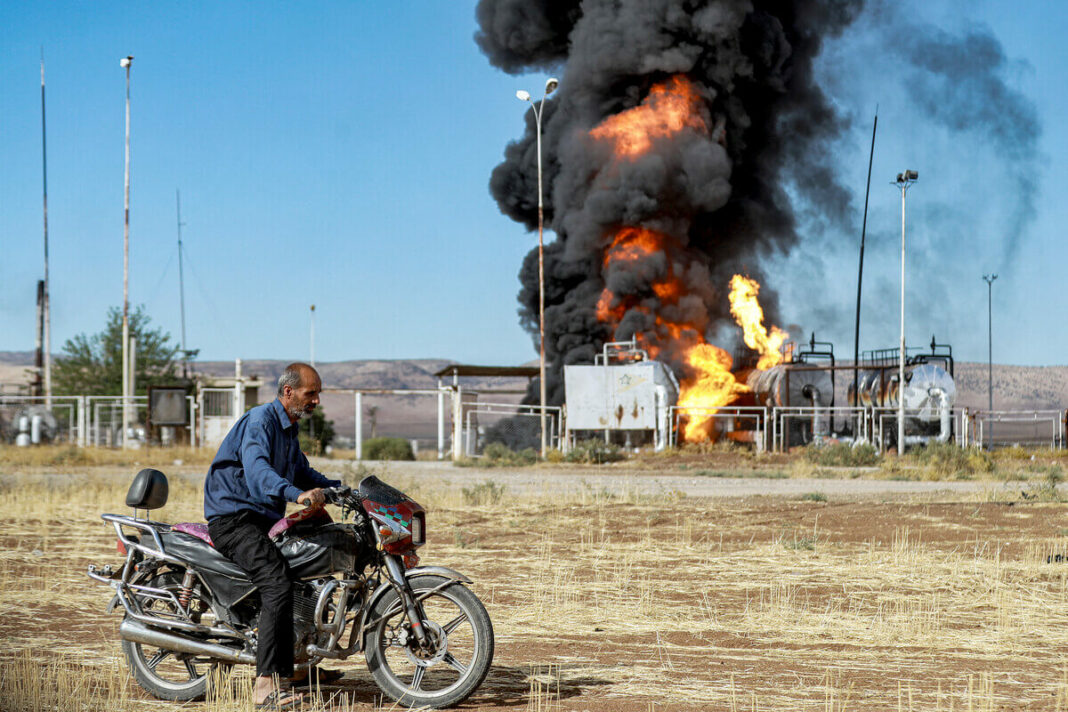Recent Turkish airstrikes in northeastern Syria in response to a suicide bombing in Ankara on Sunday for which the Kurdistan Workers’ Party (PKK) claimed responsibility and the rhetoric surrounding them have drawn sharp criticism, with critics slamming the Turkish government’s threats to target infrastructure in Iraq and Syria.
Turkish police shot dead one of the assailants, while the other died in a suicide blast outside Turkey’s interior ministry.
Turkish Foreign Minister Hakan Fidan said on Wednesday that two suspected Kurdish militants who died while staging the attack in Ankara had been trained in Syria and that Turkey reserved the right to strike a broader range of Kurdish targets in both Syria and Iraq in retaliation for Sunday’s attack.
“From now on, all infrastructure, large facilities and energy facilities belonging to [armed Kurdish groups] in Iraq and Syria are legitimate targets for our security forces,” Fidan said.
Syria’s north is controlled by the Kurdish-led, US-backed Syrian Democratic Forces (SDF), spearheaded by the People’s Protection Units (YPG).
The YPG is viewed by Ankara as an offshoot of the outlawed PKK and thus a terrorist organization.
Ankara's attack perpetrators haven't passed through our region as Turkish officials claim, and we aren't party to Turkey's internal conflict nor we encourage escalation.
Turkey is looking for pretexts to legitimize its ongoing attacks on our region and to launch a new military…— Mazloum Abdî مظلوم عبدي (@MazloumAbdi) October 4, 2023
Mazloum Abdi, the general commander of the Syrian Democratic Forces (SDF), refuted Turkey’s claims that the attackers in the Ankara bombing came from northeastern Syria. Abdi posted on X that Turkey is looking for pretexts to legitimize its ongoing attacks on the region and to engage in new military aggression.
Turkish strikes Thursday on military and infrastructure targets in Kurdish-held northeastern Syria killed at least nine people, according to a Kurdish official.
The US Department of State has expressed concern over the escalating situation. On Wednesday Vedant Patel, principal deputy spokesperson for the Department of State, emphasized the importance of implementing the 2019 ceasefires amid fresh threats from Turkey.
Ankara launched the Operation Peace Spring offensive in 2019, targeting the YPG along the Turkish-Syrian border. The YPG played a crucial role in the coalition task force set up to defeat ISIL. Turkey has established direct control over swaths of land in northern Syria through successive offensives against the YPG since 2018.
Turkish drones are striking oil installations in Darbasiyah northeast Syria in the Kurdish run zone. Today’s strikes are part of a broader campaign to degrade and destroy economic infrastructure that helps keep the local
US-backed administration afloat. The strikes follow the… https://t.co/FVPbpi6g9w— Amberin Zaman (@amberinzaman) October 5, 2023
Journalist Amberin Zaman posted on X that Turkish strikes are part of a broader campaign to degrade and destroy the economic infrastructure that sustains the local US-backed administration.
Çok açık biçimde, soykırımdan söz ediyor. Alt yapı, üst yapı ve enerji tesisleri yani yollar, tarlalar, işyerleri, okullar, hastaneler aklınıza gelecek her şey hedef alınacak deniyorsa, bu soykırımdır. O bunu desin, herhalde tehdit ettiklerinin eli armut toplamıyor. Bir de bu… pic.twitter.com/swGAUKcCsx
— Fehim Işık (@Fehim_Isik) October 4, 2023
In response to Fidan’s threats to target infrastructure in Iraq and Syria, veteran Kurdish journalist Fehim Işık said on X that targeting roads, fields, workplaces, schools and hospitals amounted to genocide as this would be destroying the livelihood of a specific ethnicity, Kurds.
Bir örgütün "alt yapı, üst yapı ve enerji tesisleri" olmaz. Devletlerin, şehirlerin, halkın böyle tesisleri olur. Türkiye devleti PKK bahanesiyle Suriye ve Irak'taki Kürtleri yok etmek istiyor. Ve sen bu alçak saldırıların lejyonusun.
Kürd'ü yakan ateşe odun taşıyan bir Kürt… https://t.co/nh5kojdbRI— sacit arvasi (@ArvasiSacit) October 4, 2023
Kurdish religious scholar Sacit Arvasi echoed this sentiment, tweeting that the Turkish state aims to eliminate Kurds in Syria and Iraq under the pretext of combating the PKK.
Savaşın kazananı olmaz.
Kürtler her zaman durdukları yerdedir.
Bölgenin demokrasi gücüdür.
Ortadoğu ve bölgemiz bir gülistan bahçesi haline getirilebilir.
Suriye’nin tek güvenli bölgesi ve milyonlarca insanın yaşadığı bölgeleri tehdit etmek yaşamı değil, ölümü getirecektir.…— Ömer ÖCALAN (@omerrocalan) October 4, 2023
Pro-Kurdish Green Left Party (YSP) lawmaker Ömer Öcalan tweeted that threatening the only safe area in Syria and the regions where millions live will bring not life, but death. He urged for an honorable and democratic solution with the Kurds and called on the public to take a stand against war.
Meanwhile, the Turkish defense ministry announced that about 60 alleged PKK positions have been targeted since Sunday, adding that numerous PKK fighters have been “neutralized,” a term Turkey uses to denote adversaries captured, wounded or killed.
